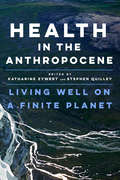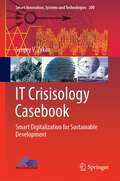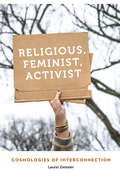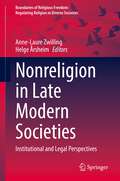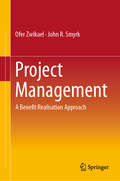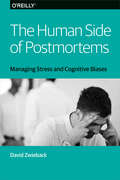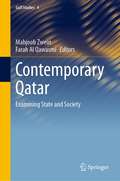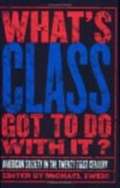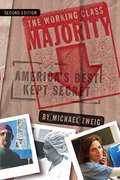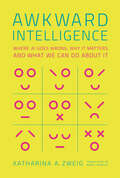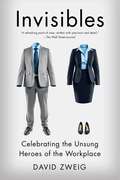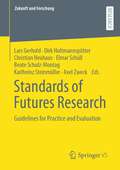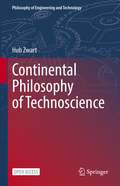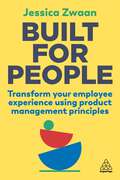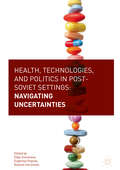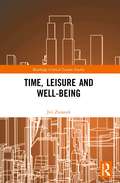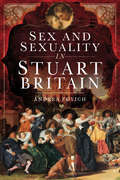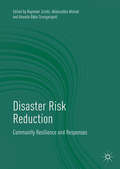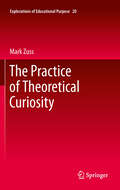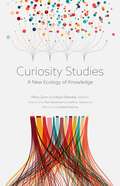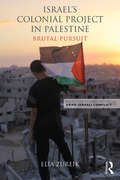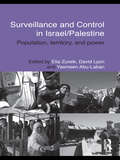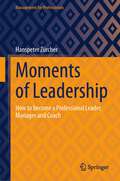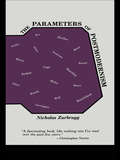- Table View
- List View
Health in the Anthropocene: Living Well on a Finite Planet (G - Reference,information And Interdisciplinary Subjects Ser.)
by Katharine Zywert Stephen QuilleyAdding to a growing body of knowledge about how the social-ecological dynamics of the Anthropocene affect human health, this collection presents strategies that both address core challenges, including climate change, stagnating economic growth, and rising socio-political instability, and offers novel frameworks for living well on a finite planet. Rather than directing readers to more sustainable ways to structure health systems, Health in the Anthropocene navigates the transition toward social-ecological systems that can support long-term human and environmental health, which requires broad shifts in thought and action, not only in formal health-related fields, but in our economic models, agriculture and food systems, ontologies, and ethics. Arguing that population health will largely be decided at the intersection of experimental social innovations and appropriate technologies, this volume calls readers to turn their attention toward social movements, practices, and ways of living that build resilience for an era of systemic change. Drawing on diverse disciplines and methodologies from fields including anthropology, ecological economics, sociology, and public health, Health in the Anthropocene maps out alternative pathways that have the potential to sustain human wellbeing and ecological integrity over the long term.
IT Crisisology Casebook: Smart Digitalization for Sustainable Development (Smart Innovation, Systems and Technologies #300)
by Sergey V. ZykovThe book focuses on the real-world case-based crisis management in digital product development. This includes forecasting, responding, and agile engineering/management methods, patterns, and practices for sustainable development. This book introduces a set of case studies for sustainability in management as a blend, the components of which have been carefully selected from a few domains adjacent to digital production such as IT-intensive operation, human resource management, and knowledge engineering, to name a few. The key ingredients of this crisis management framework include information management, tradeoff optimization, agile product development, and knowledge transfer. The case studies this book features will help the stakeholders in understanding and identifying the key technology, business, and human factors that may likely result in a digital production crisis, i.e., critically affect the organization outcomes in terms of successful digitalization and sustainable development. These factors are particularly important for the large-scale applications, typically considered very complex in managerial and technological aspects, and, therefore, specifically addressed by the discipline of IT crisisology.
Religious, Feminist, Activist: Cosmologies of Interconnection (Anthropology of Contemporary North America)
by Laurel ZwisslerIn Religious, Feminist, Activist, Laurel Zwissler investigates the political and religious identities of women who understand their social-justice activism as religiously motivated. Placing these women in historical context as faith-based activists for social change, this book discusses what their activities reveal about the public significance of religion in the pluralistic context of North America and in our increasingly globalized world. Zwissler’s ethnographic interviews with feminist Catholics, Pagans, and United Church Protestants reveal radically different views of religious and political expression and illuminate how individual women and their communities negotiate issues of personal identity, spirituality, and political responsibility. Political activists of faith recount adventurous tales of run-ins with police, agonizing moments of fear and powerlessness in the face of global inequality, touching moments of community support, and successful projects that improve the lives of others. Religious, Feminist, Activist combines religion, politics, and globalization—subjects frequently discussed in macro terms—with individual personalities and intimate stories to provide a fresh perspective on what it means to be religiously and politically engaged. Zwissler also provides an insightful investigation into how religion and politics intersect for women on the political left.
Nonreligion in Late Modern Societies: Institutional and Legal Perspectives (Boundaries of Religious Freedom: Regulating Religion in Diverse Societies)
by Anne-Laure Zwilling Helge ÅrsheimThis volume presents results from new and ongoing research efforts into the role of nonreligion in education, politics, law and society from a variety of different countries. Featuring data from a wide range of quantitative and qualitative studies, the book exposes the relational dynamics of religion and nonreligion. Firstly, it highlights the extent to which nonreligion is defined and understood by legal and institutional actors on the basis of religions, and often replicates the organisation of society and majority religions. At the same time, it displays how essential it is to approach nonreligion on its own, by freeing oneself from the frameworks from which religion is thought.The book addresses pressing questions such as: How can nonreligion be defined, and how can the “nones” be grasped and taken into account in studies on religion? How does the sociocultural and religious backdrop of different countries affect the regulation and representation of nonreligion in law and policymaking? Where and how do nonreligious individuals and collectives fit into institutions in contemporary societies? How does nonreligion affect notions of citizenship and national belonging? Despite growing scholarly interest in the increasing number of people without religion, the role of nonreligion in legal and institutional settings is still largely unexplored.This volume helps fill the gap, and will be of interest to students, researchers, policymakers and others seeking deeper understanding of the changing role of nonreligion in modern societies.
Project Management: A Benefit Realisation Approach
by Ofer Zwikael John R. SmyrkThis book is a complete project management toolkit for project leaders in business, research and industry. <P><P> Projects are approved and financed to generate benefits. Project Management: A Benefit Realisation Approach proposes a complete framework that supports this objective – from project selection and definition, through execution, and beyond implementation of deliverables until benefits are secured. <P><P> The book is the first to explain the creation of organisational value by suggesting a complete, internally-consistent and theoretically rigorous benefit-focused project management methodology, supported with an analytical technique: benefit engineering. Benefit engineering offers a practical approach to the design and maintenance of an organisation’s project portfolio. <P><P> Building upon the authors’ earlier successful book, Project Management for the Creation of Organisational Value, this comprehensively revised and expanded new book contains the addition of new chapters on project realisation. The book offers a rigorous explanation of how benefits emerge from a project. This approach is developed and strengthened — resulting in a completely client-oriented view of a project. <P><P> Senior executives, practitioners, students and academics will find in this book a comprehensive guide to the conduct of projects, which includes robust models, a set of consistent principles, an integrated glossary, enabling tools, illustrative examples and case studies.
The Human Side of PostMortems: Managing Stress And Cognitive Bias In Devops
by Dave ZwiebackMost postmortem writeups follow a predictable, linear format, writtenfrom a point of view of an omniscient narrator: 1) The outage happened (the acknowledgement) 2) Here's what we found out (the reasons) 3) Here's what we're doing to make sure this doesn't happen again (the remediation) 4) Sorry about that! (the apology) What's almost always missing is any discussion of what people working under extreme stress experienced (confusion, frustration, anger, elation, etc.), what cognitive biases clouded their thinking, how they made decisions with imperfect information, what communication patterns worked or failed, etc. Call this the human -- emotional or psychological -- postmortem. This report explains why the human postmortem is as important as the technical one. Learn how it allows for building more resilient teams and processes, and ultimately reduces the duration and severity of future outages.
Contemporary Qatar: Examining State and Society (Gulf Studies #4)
by Mahjoob Zweiri Farah Al QawasmiThis book addresses critical topics and unanswered questions on the contemporary state of Qatar. Drawing together a unique combination of authors that have researched the Gulf Cooperation Council (GCC) in general, and the state of Qatar specifically, each author provides an in-depth empirical analysis of Qatar’s current social, political, and economic landscape against a historically informed backdrop. Cognizant of its rapid state of flux, the contributors collectively provide a comprehensive overview of the intersection of these respective areas, delving into the historical creation of Qatar as a state, its politics and systems of governance, its economic strata and reliance on natural resources, its society and national identity, its new and thriving sports culture, and, most topically, matters of diplomacy, the 2017 blockade, and its armed forces. Owing to the contributors’ invaluable firsthand experience and knowledge of Qatar, this book provides valuable insights into this nation, at once old and new, and its intertwined trajectories in its socio-political and economic positionality within the region. This book is an invaluable resource for students and scholars researching the Middle East generally, and the Gulf, specifically, with interests in topics such as politics and international relations, political economy and foreign policy, development, sources of social change, societal activism, popular culture, and the various elements of identity.
What's Class Got to Do With It?: American Society in the Twenty-First Century
by Michael ZweigThe contributors to this volume argue that class identity in the United States has been hidden for too long. Their essays, published here for the first time, cover the relation of class to race and gender, to globalization and public policy, and to the lives of young adults. They describe how class, defined in terms of economic and political power rather than income, is in fact central to Americans' everyday lives. What's Class Got to Do with It? is an important resource for the new field of working class studies.
The Working Class Majority
by Michael ZweigIn this memoir of the Hudson River and of her family, Susan Fox Rogers writes from a fresh perspective: the seat of her kayak. Low in the water, she explores the bays and the larger estuary, riding the tides, marveling over sturgeons and eels, eagles and herons, and spotting the remains of the ice and cement industries. After years of dipping her paddle into the waters off the village of Tivoli, she came to know the rocks and tree limbs, currents and eddies, mansions and islands so well that she claimed that section of the river as her own: her reach. Woven into Rogers's intimate exploration of the river is the story of her life as a woman in the outdoors¿rock climbing and hiking as well as kayaking. Rogers writes of the Hudson River with skill and vivacity. Her strong sense of place informs her engagement with a waterway that lured the early Dutch settlers, entranced nineteenth-century painters, and has been marked by decades of pollution. The river and the communities along its banks become partners in Rogers's life and vivid characters in her memoir. Her travels on the river range from short excursions to the Saugerties Lighthouse to a days-long journey from Tivoli to Tarrytown and a circumnavigation of Manhattan Island, while in memory she ventures as far as the Indiana Dunes and the French Pyrenees. In a fluid, engaging voice, My Reach mixes the genres of memoir, outdoor adventure, natural and unnatural history. Rogers's interest in the flora and fauna of the river is as keen as her insight into the people who live and travel along the waterway. She integrates moments of description and environmental context with her own process of grieving the recent deaths of both parents. The result is a book that not only moves the reader but also informs and entertains.
Awkward Intelligence: Where AI Goes Wrong, Why It Matters, and What We Can Do about It
by Katharina A. ZweigAn expert offers a guide to where we should use artificial intelligence—and where we should not.Before we know it, artificial intelligence (AI) will work its way into every corner of our lives, making decisions about, with, and for us. Is this a good thing? There&’s a tendency to think that machines can be more &“objective&” than humans—can make better decisions about job applicants, for example, or risk assessments. In Awkward Intelligence, AI expert Katharina Zweig offers readers the inside story, explaining how many levers computer and data scientists must pull for AI&’s supposedly objective decision making. She presents the good and the bad: AI is good at processing vast quantities of data that humans cannot—but it&’s bad at making judgments about people. AI is accurate at sifting through billions of websites to offer up the best results for our search queries and it has beaten reigning champions in games of chess and Go. But, drawing on her own research, Zweig shows how inaccurate AI is, for example, at predicting whether someone with a previous conviction will become a repeat offender. It&’s no better than simple guesswork, and yet it&’s used to determine people&’s futures. Zweig introduces readers to the basics of AI and presents a toolkit for designing AI systems. She explains algorithms, big data, and computer intelligence, and how they relate to one another. Finally, she explores the ethics of AI and how we can shape the process. With Awkward Intelligence. Zweig equips us to confront the biggest question concerning AI: where we should use it—and where we should not.
Invisibles
by David ZweigAn inspiring look at the hidden stars in every field who perform essential work without recognition In a culture where so many strive for praise and glory, what kind of person finds the greatest reward in anonymous work? Expanding from his acclaimed Atlantic article, "What Do Fact-Checkers and Anesthesiologists Have in Common?" David Zweig explores what we can all learn from a modest group he calls "Invisibles." Their careers require expertise, skill, and dedication, yet they receive little or no public credit. And that's just fine with them. Zweig met with a wide range of Invisibles to discover first hand what motivates them and how they define success and satisfaction. His fascinating subjects include: * a virtuoso cinematographer for major films. * the lead engineer on some of the world's tallest skyscrapers. * a high-end perfume maker. * an elite interpreter at the United Nations. Despite the diversity of their careers, Zweig found that all Invisibles embody the same core traits. And he shows why the rest of us might be more fulfilled if we followed their example.From the Hardcover edition.r and a source of a truly rich life.
Invisibles
by David ZweigWhat do fact-checkers, anesthesiologists, U.N. interpreters, and structural engineers have in common? When they do their jobs poorly, the consequences can be catastrophic for their organizations. But when they do their jobs perfectly . . . they're invisible. For most of us, the better we perform the more attention we receive. Yet for many "Invisibles"--skilled professionals whose role is critical to whatever enterprise they're a part of--it's the opposite: the better they do their jobs the more they disappear. In fact, often it's only when something goes wrong that they are noticed at all. Millions of these Invisibles are hidden in every industry. You may be one yourself. And despite our culture's increasing celebration of fame in our era of superstar CEOs and assorted varieties of "genius"--they're fine with remaining anonymous. David Zweig takes us into the behind-the-scenes worlds that Invisibles inhabit. He interviews top experts in unusual fields to reveal the quiet workers behind public successes. Combining in-depth profiles with insights from psychology, sociology, and business, Zweig uncovers how these hidden professionals reap deep fulfillment by relishing the challenges their work presents. Zweig bypasses diplomats and joins an elite interpreter in a closed-door meeting at the U.N., where the media and public are never allowed. He ascends China's tallest skyscraper while it's still under construction, without the architect, guided instead by the project's lead structural engineer. He even brings us on stage during a Radiohead concert, escorted not by a member of the band, but by their chief guitar technician. Along the way, Zweig reveals that Invisibles have a lot to teach the rest of society about satisfaction and achievement. What has been lost amid the noise of self-promotion today is that not everyone can, or should, or even wants to be in the spotlight. This inspiring and illuminating book shows that recognition isn't all it's cracked up to be, and invisibility can be viewed as a mark of honor and a source of a truly rich life.
Standards of Futures Research: Guidelines for Practice and Evaluation (Zukunft und Forschung)
by Axel Zweck Karlheinz Steinmüller Lars Gerhold Dirk Holtmannspötter Christian Neuhaus Elmar Schüll Beate Schulz-MontagForesight, futures studies, but also technology assessment and trend research are characterized by a research perspective directed towards the future. These results in fundamental peculiarities have to be taken into account in the conception of studies and in practical research work. The contributions to this anthology offer guidance for scientists and practitioners and describe the criteria and standards by which the quality of results and processes in futures studies can be assessed.
Continental Philosophy of Technoscience (Philosophy of Engineering and Technology #38)
by Hub ZwartThe key objective of this volume is to allow philosophy students and early-stage researchers to become practicing philosophers in technoscientific settings. Zwart focuses on the methodological issue of how to practice continental philosophy of technoscience today. This text draws upon continental authors such as Hegel, Engels, Heidegger, Bachelard and Lacan (and their fields of dialectics, phenomenology and psychoanalysis) in developing a coherent message around the technicity of science or rather, “technoscience”. Within technoscience, the focus will be on recent developments in life sciences research, such as genomics, post-genomics, synthetic biology and global ecology. This book uniquely presents continental perspectives that tend to be underrepresented in mainstream philosophy of science, yet entail crucial insights for coming to terms with technoscience as it is evolving on a global scale today.This is an open access book.
Built for People: Transform Your Employee Experience Using Product Management Principles
by Jessica ZwaanTaking the best elements of a product-management approach and applying them to HR activity can transform the people function. This book shows you how. Written for all HR professionals and business leaders, Built for People explains how to improve workforce and business performance by developing people-centred ways of working, evidence-based decision making and a culture of continuous feedback and iteration. It explains everything from what this approach means for business professionals, what the benefits of it are and how to do it effectively. It covers how to proactively develop an employee experience which attracts, engages and retains the talent the business needs and supports them to operate at their full potential. There is also practical guidance on the importance of user research, sprint planning, vision development and how to encourage a continuous feedback loop in your team.This book includes the importance of testing and iteration and how to define metrics for success, as well as showing you how to handle organizational change, company culture clashes and how to build and improve overall business performance and employee experience at scale. Full of tools, case studies, exercises and advice from those who are already seeing the benefits of a product-management approach, this is essential reading for all business leaders needing to develop an agile, innovative and evidence-based approach to their people operations.
Health, Technologies, and Politics in Post-Soviet Settings
by Olga Zvonareva Evgeniya Popova Klasien HorstmanThis book uses a variety of empirical cases on topics including drug development, egg donation, and governance of healthcare facilities, to investigate how actors navigate the uncertainties that permeate the interfaces of health, technologies, and politics in post-Soviet settings and what the implications of their chosen navigation routes are. Contemporary societies are imbued with uncertainties, but the authors focus on settings where uncertainties multiply, making decisions, practises, and relations in everyday life precarious. Two worlds are brought into dialogue throughout the chapters of this book with the aim of facilitating mutual learning from one another - the world of science and technology studies (STS) and the high-income liberal democracies of the West, on one hand, and studies of post-socialism on the other. In so doing, this book encourages critical learning on ensuring the resilience of individual and societal health in situations of profound uncertainties. This timely collection will be of great interest to scholars, practitioners and policy makes in the fields of sociology, biomedicine, political science and public and global health.
Time, Leisure and Well-Being (Routledge Critical Leisure Studies)
by Jiri ZuzanekThe significance of work and leisure as elements of our social fabric have puzzled philosophers and social scientists for generations. This ambitious new study considers historical views of work and leisure alongside contemporary survey evidence about time-use and well-being. Combining sophisticated theoretical analysis with empirical research, the book presents a contrarian argument that defines leisure as a serious and stimulating challenge rather than an unqualified benefit or good. This is vital reading for anyone with an interest in the concept of time in the social sciences, work-life balance, organisational studies, or the history, philosophy, or sociology of work and leisure.
Sex and Sexuality in Stuart Britain
by Andrea ZuvichAn expert in Stuart England examines the sexual lives of Britons in the seventeenth and early eighteenth centuries in this frank, informative, and revealing history.Acclaimed Stuart historian Andrea Zuvich explores the sexual mores of Stuart Britain, including surprising beliefs, bizarre practices, and ingenious solutions for infertility, impotence, sexually transmitted diseases, and more. Along the way, she reveals much about the prevailing attitudes towards male and female sexual behavior.Zuvich sheds light not only on the saucy love lives of the Royal Stuarts, but also on the dark underbelly of the Stuart era with histories of prostitution, sexual violence, infanticide, and sexual deviance. She looks at everything from what was considered sexually attractive to the penalties for adultery, incest, and fornication.Sex and Sexuality in Stuart Britain touches on the fashion, food, science, art, medicine, magic, literature, love, politics, faith and superstition of the day.
Disaster Risk Reduction: Community Resilience and Responses
by Bupinder Zutshi Akbaruddin Ahmad Ananda Babu SrungarapatiThis book discusses the interconnected, complex and emerging risks in today’s societies and deliberates on the various aspects of disaster risk reduction strategies especially through community resilience and responses. It consists of selected papers presented at the World Congress on Disaster Management, which focused on community resilience and responses towards disaster risk reduction based on South Asian experiences, and closely examines the coordinated research activities involving all stakeholders, especially the communities at risk. Further, it narrates the experiences of disaster risk-reduction in different communities that have policy implications for mitigation of future disaster risks in the societies affected by these types of disasters. Written from the social science perspective to disasters rather than an engineering approach, the book helps development and governance institutions to prioritize disasters as a problem of development rather than being parallel to it.
The Practice of Theoretical Curiosity
by Mark ZussThe desire for knowledge is an abiding facet of human experience and cultural development. This work documents curiosity as a sociohistorical force initiating research across the disciplines. Projects generated by theoretical curiosity are presented as historical and material practices emerging as expressions of embodied knowledge and experience. The shifting cultural, philosophical and practical relations between theory and curiosity are situated within classical, medieval, early modern and contemporary communities of practice. The Practice of Theoretical Curiosity advocates for a critical, aesthetic engagement in everyday life. Its purpose is to examine the pedagogical grounds and questions that motivate research programs in the sciences, education, technoculture and post-war social movements. Theoretical curiosity continually resists disciplinary limits. It is a core, embodied process uniting human pursuits of knowledge and power. This inquiry into inquiry itself offers an appreciation of the vital continuity between the senses, perception, and affect and concept development. It is informed by a critical reading of phenomenology as the embodied practice of researchers. This study sponsors a deepening of theory in practice and the practice of theoretical exploration. As a contribution to pedagogical practice, it offers a historical critique of the usually unquestioned philosophical, political and ethical grounds for educational, scientific and social research. The Practice of Theoretical Curiosity profiles significant alliances and persona as agents for the pursuit of novel and often controversial research, adventures and discovery. It claims that the place of technology and the technical is the primary channel for contemporary inquiry. The technosciences of genomics, artificial life and astrobiology are considered as contemporary extensions of a perennial desire to pursue and resist the limits of existing knowledge and representation.
Curiosity Studies: A New Ecology of Knowledge
by Perry Zurn Arjun ShankarThe first English-language collection to establish curiosity studies as a unique field From science and technology to business and education, curiosity is often taken for granted as an unquestioned good. And yet, few people can define curiosity. Curiosity Studies marshals scholars from more than a dozen fields not only to define curiosity but also to grapple with its ethics as well as its role in technological advancement and global citizenship. While intriguing research on curiosity has occurred in numerous disciplines for decades, no rigorously cross-disciplinary study has existed—until now. Curiosity Studies stages an interdisciplinary conversation about what curiosity is and what resources it holds for human and ecological flourishing. These engaging essays are integrated into four clusters: scientific inquiry, educational practice, social relations, and transformative power. By exploring curiosity through the practice of scientific inquiry, the contours of human learning, the stakes of social difference, and the potential of radical imagination, these clusters focus and reinvigorate the study of this universal but slippery phenomenon: the desire to know. Against the assumption that curiosity is neutral, this volume insists that curiosity has a history and a political import and requires precision to define and operationalize. As various fields deepen its analysis, a new ecosystem for knowledge production can flourish, driven by real-world problems and a commitment to solve them in collaboration. By paying particular attention to pedagogy throughout, Curiosity Studies equips us to live critically and creatively in what might be called our new Age of Curiosity.Contributors: Danielle S. Bassett, U of Pennsylvania; Barbara M. Benedict, Trinity College; Susan Engel, Williams College; Ellen K. Feder, American U; Kristina T. Johnson, Massachusetts Institute of Technology; Narendra Keval; Christina León, Princeton U; Tyson Lewis, U of North Texas; Amy Marvin, U of Oregon; Hilary M. Schor, U of Southern California; Seeta Sistla, Hampshire College; Heather Anne Swanson, Aarhus U.
Israel's Colonial Project in Palestine: Brutal Pursuit (Routledge Studies on the Arab-Israeli Conflict)
by Elia ZureikColonialism has three foundational concerns - violence, territory, and population control - all of which rest on racialist discourse and practice. Placing the Zionist project in Israel/Palestine within the context of settler colonialism reveals strategies and goals behind the region’s rules of governance that have included violence, repressive state laws and racialized forms of surveillance. In Israel’s Colonial Project in Palestine: Brutal Pursuit, Elia Zureik revisits and reworks fundamental ideas that informed his first work on colonialism and Palestine three decades ago. Focusing on the means of control that are at the centre of Israel’s actions toward Palestine, this book applies Michel Foucault’s work on biopolitics to colonialism and to the situation in Israel/Palestine in particular. It reveals how racism plays a central role in colonialism and biopolitics, and how surveillance, in all its forms, becomes the indispensable tool of governance. It goes on to analyse territoriality in light of biopolitics, with the dispossession of indigenous people and population transfer advancing the state’s agenda and justified as in the interests of national security. The book incorporates sociological, historical and postcolonial studies into an informed and original examination of the Zionist project in Palestine, from the establishment of Israel through to the actions and decisions of the present-day Israeli government. Providing new perspectives on settler colonialism informed by Foucault’s theory, and with particular focus on the role played by state surveillance in controlling the Palestinian population, this book is a valuable resource for students and scholars interested in the Arab-Israeli Conflict and Colonialism.
Surveillance and Control in Israel/Palestine: Population, Territory and Power (Routledge Studies in Middle Eastern Politics)
by Elia ZureikSurveillance is always a means to an end, whether that end is influence, management or entitlement. This book examines the several layers of surveillance that control the Palestinian population in Israel and the Occupied Territories, showing how they operate, how well they work, how they are augmented, and how in the end their chief purpose is population control. Showing how what might be regarded as exceptional elsewhere is here regarded as the norm, the book looks not only at the political economy of surveillance and its technological and military dimensions, but also at the ordinary ways that Palestinians in Israel and the occupied territories are affected in their everyday lives. Written in a clear and accessible style by experts in the field, this book will have large appeal for academic faculty as well as graduate and senior undergraduate students in sociology, political science, international relations, surveillance studies and Middle East studies.
Moments of Leadership: How to become a Professional Leader, Manager and Coach (Management for Professionals)
by Hanspeter ZürcherThere are moments in leadership when opportunities open up: Opportunities for better teamwork, opportunities for orientation, for professional conversations, and for personal development and reflection. This book describes over 60 such opportunities, pragmatic, solution-oriented, and tested for many years. Based on concrete examples, it thus provides impulses for effective strategies and new ways of solving problems in all areas of cooperation and leadership. The book is intended to serve as a guide from which not only leaders but also managers and coaches can benefit.
The Parameters of Postmodernism
by Nicholas ZurbruggFirst published in 2004. Routledge is an imprint of Taylor & Francis, an informa company.
